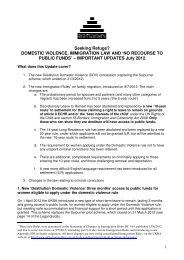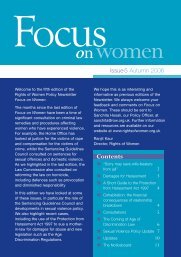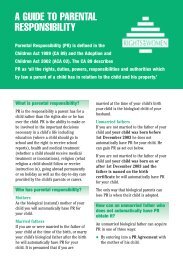Seeking Refuge? - Rights of Women
Seeking Refuge? - Rights of Women
Seeking Refuge? - Rights of Women
Create successful ePaper yourself
Turn your PDF publications into a flip-book with our unique Google optimized e-Paper software.
efuse you protection that the UK Border Agency<br />
will decide whether or not your appeal should be<br />
decided under the non-suspensive appeals<br />
process.<br />
If you are from one <strong>of</strong> the above countries, the UK<br />
Border Agency will decide that your claim should<br />
be decided under the non-suspensive appeals<br />
process unless your case is not clearly<br />
unfounded.<br />
A claim is clearly unfounded if it is so clearly<br />
without substance that it is bound to fail 26 . This<br />
means that claims are clearly unfounded if, when<br />
looking at them, the UK Border Agency thinks<br />
that they are almost certain to fail.<br />
In a later Court <strong>of</strong> Appeal decision 27 , it was<br />
decided that the factors which should be taken<br />
into account when deciding whether or not a<br />
claim is clearly unfounded are:<br />
• the facts <strong>of</strong> the case;<br />
• how the facts <strong>of</strong> the case relate to what is<br />
known about the country the asylum-seeker<br />
has come from;<br />
• whether the account that the asylum-seeker<br />
has given can be believed, either entirely or in<br />
part; and,<br />
• whether, if the account can be believed, it comes<br />
within the relevant law (see Chapter 2).<br />
An example <strong>of</strong> a case that would be clearly<br />
unfounded would be where a woman claimed<br />
asylum in the UK, but in her application stated<br />
that she did not fear harm and instead came to<br />
the UK to work. Alternatively, a claim could be<br />
clearly unfounded if a person could have gone to<br />
another part <strong>of</strong> their country to be safe.<br />
If you think that your appeal should be held<br />
within the UK, you should seek legal advice as<br />
soon as possible.<br />
Your legal representative can challenge the<br />
decision to make your appeal one that is heard<br />
outside <strong>of</strong> the UK through judicial review<br />
proceedings. Judicial Review is the process<br />
through which decisions taken by the UK Border<br />
Agency (and other public authorities) can be<br />
challenged before a court. In considering whether<br />
or not your claim is clearly unfounded, the court<br />
will look carefully at your application and any<br />
supporting evidence that you have.<br />
If you have to appeal against your decision from<br />
outside the UK (because your claim is to be<br />
decided under the non-suspensive appeals<br />
process), you have to submit your notice <strong>of</strong> appeal<br />
to the AIT within 28 calendar days <strong>of</strong> leaving the<br />
UK. The type <strong>of</strong> appeal form you have to<br />
complete is: AIT 3 form Exercising your right<br />
<strong>of</strong> appeal after having left the UK. This form<br />
and the notes that accompany it will be sent to<br />
you with your decision letter. They can also be<br />
downloaded from the AIT website here:<br />
www.ait.gov.uk/FormsGuidance/standardAppealF<br />
orms.htm. In addition to discussing your appeal<br />
with your legal representative, you should also<br />
talk to her (or him) about how you can stay in<br />
touch with them when you are in your country.<br />
Appeals in detention<br />
If you are in detention, you will have to submit your<br />
notice <strong>of</strong> appeal within five working days <strong>of</strong> being<br />
given the Home Office decision notice.<br />
If your case is being decided under the detained<br />
fast-track, you have to submit your notice <strong>of</strong><br />
appeal within two working days <strong>of</strong> being given<br />
the Home Office decision notice. For further<br />
information about the detained fast-track, see<br />
Chapter 4.<br />
You can give your notice <strong>of</strong> appeal to the <strong>of</strong>ficers<br />
in the detention centre who are responsible for<br />
you. They will give it to the AIT immediately. The<br />
Home Office must then give you and the AIT the<br />
documents for the appeal.<br />
The rules setting out the procedure for<br />
appeals in the detained fast-track are the<br />
Asylum and Immigration Tribunal (Fasttrack<br />
Procedure) Rules 2005 you can read<br />
them here:<br />
www.opsi.gov.uk/si/si2005/2005 0560.htm<br />
There are a number <strong>of</strong> legal representatives who<br />
work with women in detention. You will be given<br />
a legal representative to assist you with your case<br />
if you are eligible for public funding (otherwise<br />
known as legal aid). On the day you arrive in<br />
detention, or the next day, you will be given time<br />
to see your legal representative. It is important to<br />
give your legal representative as much information<br />
about yourself and your case as you can. This<br />
information will help them to present your case.<br />
Your legal representative will also be able to<br />
advise you on a negative decision and appealing<br />
against it.<br />
Due to the speed in which decisions are taken in<br />
the fast-track, your legal representative (or you, if<br />
you don’t have one) can apply to the AIT for your<br />
appeal:<br />
48
















